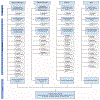Cannabinoids for the treatment of mental disorders and symptoms of mental disorders: a systematic review and meta-analysis
- PMID: 31672337
- PMCID: PMC6949116
- DOI: 10.1016/S2215-0366(19)30401-8
Cannabinoids for the treatment of mental disorders and symptoms of mental disorders: a systematic review and meta-analysis
Erratum in
-
Correction to Lancet Psychiatry 2019; 6: 995-1010.Lancet Psychiatry. 2020 Jan;7(1):e3. doi: 10.1016/S2215-0366(19)30491-2. Lancet Psychiatry. 2020. PMID: 31860461 No abstract available.
Abstract
Background: Medicinal cannabinoids, including medicinal cannabis and pharmaceutical cannabinoids and their synthetic derivatives, such as tetrahydrocannabinol (THC) and cannabidiol (CBD), have been suggested to have a therapeutic role in certain mental disorders. We analysed the available evidence to ascertain the effectiveness and safety of all types of medicinal cannabinoids in treating symptoms of various mental disorders.
Methods: For this systematic review and meta-analysis we searched MEDLINE, Embase, PsycINFO, the Cochrane Central Register of Controlled Clinical Trials, and the Cochrane Database of Systematic Reviews for studies published between Jan 1, 1980, and April 30, 2018. We also searched for unpublished or ongoing studies on ClinicalTrials.gov, the EU Clinical Trials Register, and the Australian and New Zealand Clinical Trials Registry. We considered all studies examining any type and formulation of a medicinal cannabinoid in adults (≥18 years) for treating depression, anxiety, attention-deficit hyperactivity disorder (ADHD), Tourette syndrome, post-traumatic stress disorder, or psychosis, either as the primary condition or secondary to other medical conditions. We placed no restrictions on language, publication status, or study type (ie, both experimental and observational study designs were included). Primary outcomes were remission from and changes in symptoms of these mental disorders. The safety of medicinal cannabinoids for these mental disorders was also examined. Evidence from randomised controlled trials was synthesised as odds ratios (ORs) for disorder remission, adverse events, and withdrawals and as standardised mean differences (SMDs) for change in symptoms, via random-effects meta-analyses. The quality of the evidence was assessed with the Cochrane risk of bias tool and Grading of Recommendations, Assessment, Development and Evaluation (GRADE) approach. This study is registered with PROSPERO (CRD42017059372, CRD42017059373, CRD42017059376, CRD42017064996, and CRD42018102977).
Findings: 83 eligible studies (40 randomised controlled trials, n=3067) were included: 42 for depression (23 randomised controlled trials; n=2551), 31 for anxiety (17 randomised controlled trials; n=605), eight for Tourette syndrome (two randomised controlled trials; n=36), three for ADHD (one randomised controlled trial; n=30), 12 for post-traumatic stress disorder (one randomised controlled trial; n=10), and 11 for psychosis (six randomised controlled trials; n=281). Pharmaceutical THC (with or without CBD) improved anxiety symptoms among individuals with other medical conditions (primarily chronic non-cancer pain and multiple sclerosis; SMD -0·25 [95% CI -0·49 to -0·01]; seven studies; n=252), although the evidence GRADE was very low. Pharmaceutical THC (with or without CBD) worsened negative symptoms of psychosis in a single study (SMD 0·36 [95% CI 0·10 to 0·62]; n=24). Pharmaceutical THC (with or without CBD) did not significantly affect any other primary outcomes for the mental disorders examined but did increase the number of people who had adverse events (OR 1·99 [95% CI 1·20 to 3·29]; ten studies; n=1495) and withdrawals due to adverse events (2·78 [1·59 to 4·86]; 11 studies; n=1621) compared with placebo across all mental disorders examined. Few randomised controlled trials examined the role of pharmaceutical CBD or medicinal cannabis.
Interpretation: There is scarce evidence to suggest that cannabinoids improve depressive disorders and symptoms, anxiety disorders, attention-deficit hyperactivity disorder, Tourette syndrome, post-traumatic stress disorder, or psychosis. There is very low quality evidence that pharmaceutical THC (with or without CBD) leads to a small improvement in symptoms of anxiety among individuals with other medical conditions. There remains insufficient evidence to provide guidance on the use of cannabinoids for treating mental disorders within a regulatory framework. Further high-quality studies directly examining the effect of cannabinoids on treating mental disorders are needed.
Funding: Therapeutic Goods Administration, Australia; Commonwealth Department of Health, Australia; Australian National Health and Medical Research Council; and US National Institutes of Health.
Copyright © 2019 Elsevier Ltd. All rights reserved.
Conflict of interest statement
Conflicts of interest
MF and LD have been investigators on untied investigator-driven educational grants funded by Reckitt Benckiser, Mundipharma and Seqirus. MF, GC, and LD have been investigators on untied investigator-driven educational grants funded by Indivior.
Comment in
-
Cannabis in psychiatric disorders: the cart before the horse?Lancet Psychiatry. 2019 Dec;6(12):968-969. doi: 10.1016/S2215-0366(19)30375-X. Epub 2019 Oct 28. Lancet Psychiatry. 2019. PMID: 31672338 No abstract available.
-
Cannabinoids for the treatment of mental disorders.Lancet Psychiatry. 2020 Feb;7(2):125. doi: 10.1016/S2215-0366(19)30509-7. Lancet Psychiatry. 2020. PMID: 31981532 No abstract available.
-
Cannabinoids for the treatment of mental disorders.Lancet Psychiatry. 2020 Feb;7(2):125-126. doi: 10.1016/S2215-0366(19)30516-4. Lancet Psychiatry. 2020. PMID: 31981533 No abstract available.
-
Cannabinoids for the treatment of mental disorders.Lancet Psychiatry. 2020 Feb;7(2):126-127. doi: 10.1016/S2215-0366(19)30523-1. Lancet Psychiatry. 2020. PMID: 31981534 No abstract available.
-
Cannabinoids for the treatment of mental disorders - Author's reply.Lancet Psychiatry. 2020 Feb;7(2):127-128. doi: 10.1016/S2215-0366(19)30526-7. Lancet Psychiatry. 2020. PMID: 31981535 No abstract available.
References
-
- Häuser W, Finn DP, Kalso E, et al. European Pain Federation (EFIC) position paper on appropriate use of cannabis-based medicines and medical cannabis for chronic pain management. 2018; 22(9): 1547–64. - PubMed
-
- Lucas P, Walsh Z. Medical cannabis access, use, and substitution for prescription opioids and other substances: A survey of authorized medical cannabis patients. International Journal of Drug Policy 2017; 42: 30–5. - PubMed
-
- Witkin JM, Tzavara ET, Davis RJ, Li X, Nomikos GG. A therapeutic role for cannabinoid CB 1 receptor antagonists in major depressive disorders. Trends in pharmacological sciences 2005; 26(12): 609–17. - PubMed
Publication types
MeSH terms
Substances
Grants and funding
LinkOut - more resources
Full Text Sources
Other Literature Sources
Medical
Miscellaneous


